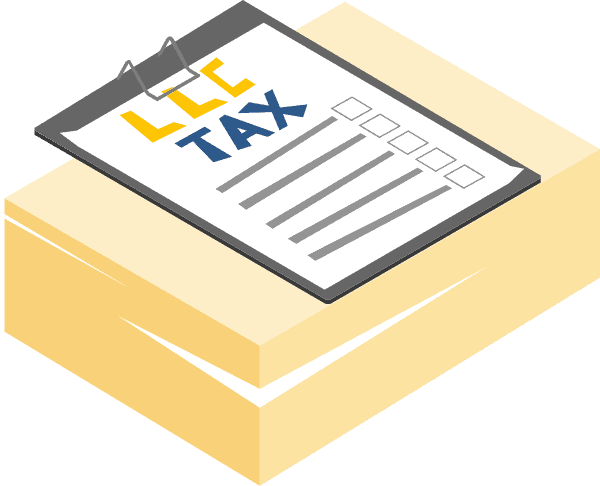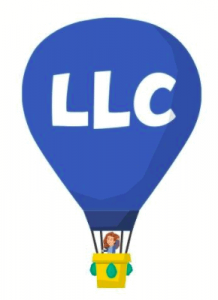Can You Start an LLC If You Owe Back Taxes?
There is no law that prevents starting an LLC if you owe back taxes. In fact, many people have started LLCs while owing back taxes. However, having a personal tax liability might make it more difficult for your LLC to be successful. Here we’ll show you how owing back taxes can impact your LLC, and what you can do about them.
In this article, we'll cover:

What Are Back Taxes?
Most people have to file state and federal taxes on an annual basis. Sometimes you get money back, and sometimes you owe. If you don’t pay what you own on time, then you owe back taxes. Back taxes can be owed to your state, or to the IRS. However, in most cases, state tax bills are easier to manage as the tax rates are lower when compared to federal rates.
You may owe back taxes for many reasons, including:
- You were self-employed but didn’t pay your estimated taxes
- Didn’t withhold enough taxes from your paycheck or other earnings
- Unexpected profits on investments you sold, such as stock, real estate
The sooner you pay your back taxes, the better off you’ll be, because interest and penalties can cause tax debt to grow over time.
How Will Back Taxes Effect Starting an LLC?
In the short run, owing back taxes has no effect on whether or not you can start an LLC. The only thing you need to do to start an LLC is file the proper state paperwork and pay the state filing fee. However, owing taxes to the IRS or your state’s tax authority may make it harder to maintain and grow your LLC. Here are some uphill climbs you might face as a tax scofflaw.
Obtaining Loans
When going through the loan process, banks will want to know who they are loaning money to, and if the person getting the loan can pay the money back. Banks use all sorts of measures to determine who to lend money to, including personal assets, credit scores, and tax information. Back taxes can lower your credit score and they will also show up on any tax information you submit to the loan officer. Owing back taxes is something that won’t help obtain a loan, and if in fact a loan is offered, the interest rate will be substantially higher, which will increase the monthly payment on the loan.
Attracting Investors
LLCs can attract investment by adding new members. New members can infuse the business with cash. The problem is, of course, that a potential LLC member may not want to jump on board with a business owner who owes back taxes. If the potential investor does their due diligence and finds out that one of the LLC owners has substantial tax debt, it may cause them to think twice about joining the business.
Cash Flow
The name of the game in any business is cash flow. You need more money coming in than going out. Even if your LLC has gangbusters sales slinging late night tacos and burritos from your food truck, some of the profits you have coming in will need to go towards paying off your tax debt. The sooner you pay off your debt, the sooner you can apply your profits to re-investing in your business.
Possible Garnishment
Thankfully the separation created by forming an LLC will keep the IRS and your state tax authority from being able to garnish the LLC’s assets or those of your other members. This doesn’t mean that they can’t come after your personal assets. With the tax man garnishing your wages and sniffing around your personal assets to pay off your back taxes, it will make it harder to successfully operate an LLC.
Resolve Back Taxes With the IRS
The sooner you get the your delinquent taxes off your back, the sooner you can return your full focus to your LLC. Obviously your best option is to pay the owed taxes outright, but that’s often unrealistic. Luckily you do have options.
Delinquent Tax Payment Options
Many of us pay off our credit cards and personal loans in increments, usually through payment plans we’ve set up. The IRS is no different, offering plenty of options for most every tax situation.
Long Term Installment Plans: If you can’t pay your back taxes in full within 180 days, the IRS will let you pay in installment plans, sometimes over 72 months. You can request an installment agreement by applying online or by submitting IRS Form 9465. You can also set up an installment plan by calling the IRS directly at 1-800-829-1040.
Reduce Your Tax Bill By Requesting a Penalty Abatement: An IRS tax abatement is a reduction in the amount of taxes an individual is responsible for paying. You can use IRS Form 843 to request an abatement of certain taxes, interest, penalties, and fees.
Offer In Compromise: An Offer In Compromise is an agreement between the taxpayer and the IRS that settles any outstanding tax liabilities for less than the full amount owed. You’ll need to answer a series of questions using the Offer in Compromise Pre-Qualifier tool to find out if you are eligible for tax relief.
Request a Suspension of Collections: In some cases the IRS allows delinquent taxpayers to request their payments be put on hold by obtaining Currently Not Collectible (CNC) status. To do this you’ll need to call or write the IRS (phone calls are faster). The IRS may ask you to fill out and submit IRS Form 433, which gives them an insight into your current income and expenses. Obtaining CNC status defers current tax payment until a time when you can pay off what you owe. While your account is on hold, the IRS won’t try to collect your taxes, but penalties and interest will continue to accrue.
Resolve Back Taxes With Your State
Paying off tax debt with your state is similar to setting up various payment plans with the IRS. The important thing is to not let your owed taxes fester. Penalties and fees can bury you in deeper debt real quick, leaving less money with which to operate your LLC. To start your personal finances on the road to wellness, you’ll need to call your state’s tax authority and ask what options are available to you.
Can the IRS Come After an LLC for Personal Taxes?
In most cases the IRS cannot collect on an individual member’s unpaid taxes by seizing LLC assets. In the eyes of the law, an LLC is a separate entity from its owners (members). This distinction is what protects the members of an LLC from lawsuits or liens against the LLC. In a similar manner, the assets of the LLC are shielded from the actions of its members.
This question of whether the IRS can seize LLC assets for members’ unpaid taxes has gone all the way to the Supreme Court. A 1998 case, Drye v. United States, proposed that in the event of substantial tax debt, the IRS may in fact levy the assets of a business to pay the debt of an LLC member. However, a 2003 review of the ruling established that unless the LLC was being used in a fraudulent manner to avoid paying taxes, then the IRS has no right to seize money and assets from the LLC to pay a member’s debt. In short, unless an LLC member is going above and beyond to escape paying back taxes, it is highly unlikely that the IRS will come after an LLC for personal back taxes.






